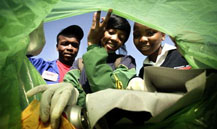 |
|
Learners from surrounding schools do their bit for the environment taking part in the first ever Green Festival hosted on the Bloemfontein Campus.
10 September 2012
|
Celebrating all things green, the University of the Free State (UFS)’s first Green Festival started with a bang with the initiative being nominated for a national Eco-Logic Award.
The festival, hosted on Saturday 8 September 2012, drew the attention of a panel of highly respected environmentally aware individuals who selected the green initiative as one of five finalists in the recycling category of the Eco-logic awards. The awards are hosted in association with SABC3 and the university was selected out of nearly three hundred entries. The university will now compete with other finalists at a gala dinner at the Cradle of Humankind on 27 September 2012.
With learners from surrounding high schools who were invited to help clean parts of the city, the Bloemfontein Campus was abuzz with activity on Saturday. Staff and students from the university joined learners in taking part in activities such as the Green Film Festival where documentary movies on environmental issues were screened. Stalls and exhibitions displayed sustainable green materials and organic food. Residences took part in a body-painting competition to raise awareness about going green.
Prof. Jonathan Jansen, Rector and Vice-Chancellor, delivered a Green Festival address and praised Kovsie students for taking the lead in going green.“Our country’s future depends on us caring for the environment,” he told learners and students. “If we don’t take care of the environment, we will all be gone. It is about the next generation, about what we leave for the children.”